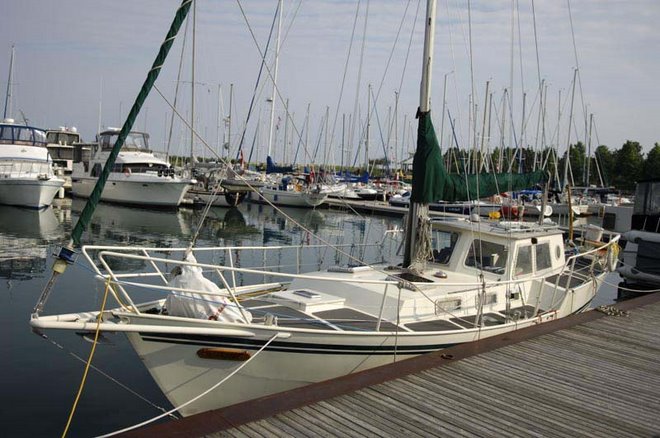 |
| Drooping fenders Photoshopped out to avoid bruising the eyes of the sensitive...photo (c) Jeff Cooper |
When I last
discussed the topic of Alchemy's main, we had yet to actually sail with it. Well, now we have, and we and our sailmaker (Ron Fernandes of Triton Sails) have judged it's worthy to keep as a spare. In the meantime, as
previously mentioned, it's been taken to Mississauga to act as a template for a new, 9.5 ounce, roachier, heavier-built new main.
 |
| It's only laid out on a floor that the curve of the luff and the "belly" of the sail are apparent. |
I have the
Tides Marine measuring kit and will order that gear shortly with American dollars put aside for such things. Ron concurs that it's a good choice for offshore, combined, of course,
with mainsail lazyjacks to "tame" the now-reliably plummeting main. The combination of a main designed to be
loose-footed, but with full battens (chafe-resistant patches in the right places) and tripled, UV-resistant stitching and reinforced grommets seems to be the way to go.
 |
| The little bits of line are called "reefing points" and allow an orderly capture of the unused folds, or "bunt" of a reefed-down sail. |
The actual location of the reef points, which can be thought of as "gears on a sail" as they act to reduce sail area and therefore the ability of the wind to drive the boat, is still to be discussed. I favour a deep first and second reef for
Alchemy, based on the her
rather high S/AD ratio, i.e. she likes a good breeze to get going, although she
will move in the light stuff, and this attitude is premised on a full hoist into the low 20-knots apparent wind range, but a deep first reef in order to take gusts to 30. The second reef could leave as little as 40% of the main's area still in play, or
as John Harries puts it "the third reef". The
question whether or not to use a storm trysail is still an open one, as of yet. I want to deliberately sail
Alchemy in crappy, if transient, heavy weather here on Lake Ontario (if I can find it, and I seem to have that knack, alas) to see if even a fully reefed new main is too much when we intend to keep actively sailing, instead of hoving to. So more research and opinion-culling is called for, and I will be discussing in January my conclusions with our sailmaker, who is a genial fellow and seems quite pleased to be doing a relatively rare for him (given our inland locale) "offshore" mainsail.







No comments:
Post a Comment